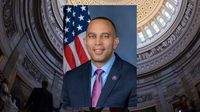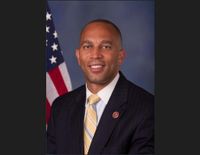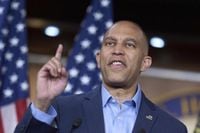The political temperature in Washington has climbed yet again as the National Republican Congressional Campaign Committee (NRCC) and the Democratic Congressional Campaign Committee (DCCC) traded sharp barbs over competing visions for the nation’s future. The latest spat centers on House Minority Leader Hakeem Jeffries (D-N.Y.), who finds himself in the crosshairs of Republican critics while simultaneously pushing for bipartisan cooperation on looming government funding deadlines.
On Tuesday, August 12, 2025, the NRCC released a pointed memo mocking Jeffries and House Democrats for what they called “wildly unpopular” proposals outlined as part of a tongue-in-cheek “Project 2026.” According to Fox News, the memo was timed to coincide with the expiration of a self-imposed 100-day deadline Jeffries had set back in April. At that time, as reported by The Hill, Jeffries promised, “Over these next 100 days, House Democrats are going to lay out a blueprint for a better America. And you will see a vision for this country’s future that isn’t about Donald Trump. It’s all about you.”
But with the clock running out and no sweeping new vision publicly unveiled, Republicans wasted no time in pouncing. The NRCC’s memo, dripping with satire, accused Democrats—under the guidance of Jeffries and progressive standard-bearer Alexandria Ocasio-Cortez—of wanting to “move swiftly and unapologetically to return to Joe Biden’s America and implement the bold, transformational change our base demands.”
The list of policy ideas the NRCC attributes to Democrats is both sweeping and, at times, intentionally exaggerated. Among the eight proposals highlighted: “Bring Back Wasteful Government Spending and High Crime,” “Open Borders. Full Stop,” and the repeated “Impeach President Trump. Again. And Again.” The memo also lampooned the idea of a federal “Carbon Lifestyle Tax” targeting Americans who own trucks, SUVs, or even backyard grills, and referenced New York City Democratic mayoral candidate Zohran Mamdani’s floated concept of government-run grocery stores in underserved neighborhoods.
On the economic front, the NRCC painted Democrats as eager to “expand bloated government programs and bankroll the Green New Deal,” while reversing the tax cuts enacted under former President Donald Trump. The memo further alleged that Democrats want to “abolish ICE permanently,” “ban border wall construction and tear down existing barriers,” and “provide taxpayer-funded healthcare, housing, and legal aid for every undocumented immigrant.”
Culture war issues were not spared. The NRCC charged Democrats with wanting to be “More Woke, Less Rational,” mandating pronouns and diversity, equity, and inclusion (DEI) training in every school and workplace, and even banning advertisements featuring celebrities like Sydney Sweeney or comedian Shane Gillis. As NRCC spokesman Mike Marinella put it to Fox News Digital, “This is the America Democrats want to build. Higher taxes, open borders, skyrocketing gas prices, no more gas cars, crime in the streets, pronouns before commonsense, and no more freedom. House Republicans are the only thing standing between you and the nightmare of 'Project 2026.’”
Democrats, for their part, were quick to fire back. Viet Shelton, a spokesperson for the DCCC, dismissed the NRCC’s memo as “big talk by the party who’s betrayed the middle-class so they can suck-up to their billionaire donors.” In his statement to Fox News Digital, Shelton added, “The Republican agenda is marked by rising costs, lost manufacturing jobs, a Big, Ugly Law that everyone hates, and a string of broken promises. A tidal wave of recent polling confirms their majority is rapidly slipping away. It’s no wonder House Republicans are desperately attempting to distract from their failed leadership and refusal to get a single thing done for the American people.”
This fierce exchange comes as Congress faces a critical deadline: government funding expires on September 30, 2025. On the same day the NRCC released its memo, Jeffries and Senate Democratic Leader Chuck Schumer (D-N.Y.) sent a letter to Speaker Mike Johnson (R-La.) and Senate Majority Leader John Thune (R-S.D.), urging a so-called “Big Four” meeting to hash out a bipartisan path forward and avert a government shutdown. As reported by KVML, the letter warned of the risks of one-party rule, stating, “The Trump Administration and many within your party are preparing to ‘go it alone’ and continue to legislate on a solely Republican basis. As a result of your choice to pursue a partisan agenda this Congress, 15 million Americans will now lose their health care. Put simply, it need not be this way.”
Jeffries and Schumer’s letter emphasized the need for bipartisan cooperation to protect health care access and lower the cost of living for all Americans. “Americans – whether Republican, Democrat, or Independent – want their leaders to put them first and focus on lowering the cost of living here in America. Instead, over the past seven months, Republicans in both the Senate and House have largely rejected bipartisanship, which has been devastating for American families who will now pay more for everything from health care, to groceries, to utility bills, to essential goods and services,” they wrote.
The Democratic leaders argued that the narrow Republican majorities in Congress and Donald Trump’s slim presidential victory were not mandates for a hardline partisan agenda. “This is not what voters had in mind when they handed Republicans very narrow majorities in Congress and a paper-thin presidential victory to Donald Trump,” the letter stated. They requested an urgent meeting to discuss the funding deadline and what they called the “health care crisis you have visited upon the American people.”
Meanwhile, the NRCC’s “Project 2026” memo continued to dominate headlines, with various outlets including NJ.com and The Hill noting its pointed criticism of Jeffries for missing his self-imposed deadline. The memo’s allegations—ranging from “abolish ICE” to “institute a federal ‘Carbon Lifestyle Tax’”—were derided by Democrats as outlandish and misleading, but the NRCC maintained that these were fair characterizations of the Democratic agenda.
At the heart of this political back-and-forth lies a deeper question: What do Americans truly want from their lawmakers? Jeffries, in his earlier remarks reported by The Hill, had promised a forward-looking vision not focused on Trump but on ordinary people. “How can we make your life better? How can we put more money in your pocket? How can we lower your costs?” he asked. Yet, as the deadline passed, Republicans seized on the absence of a detailed plan as evidence that Democrats are out of touch with voters.
The DCCC, in turn, painted Republicans as obstructionists more interested in scoring political points than governing. “It’s no wonder House Republicans are desperately attempting to distract from their failed leadership and refusal to get a single thing done for the American people,” Shelton said.
As the September 30 funding deadline looms and campaign season heats up, both parties are doubling down on their messages. Whether voters see these exchanges as genuine debate or mere political theater could shape the contours of the next election—and the future of American governance.
With both sides digging in and the stakes rising, the coming weeks may offer a revealing test of whether bipartisan compromise is still possible in a deeply divided Washington.



